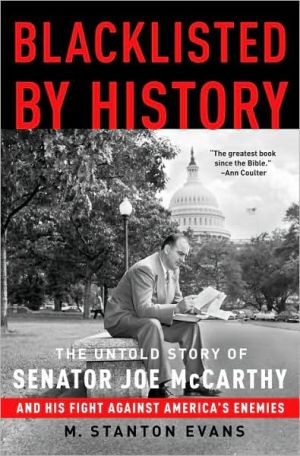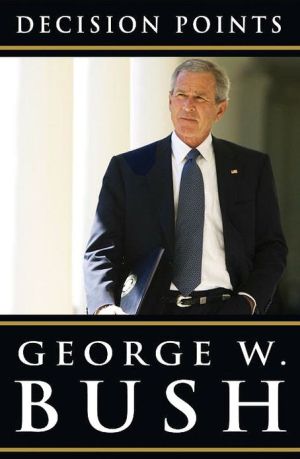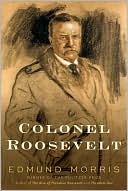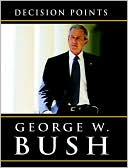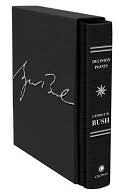Blacklisted by History: The Untold Story of Senator Joe McCarthy and His Fight Against America's Enemies
Accused of creating a bogus Red Scare and smearing countless innocent victims in a five-year reign of terror, Senator Joseph McCarthy is universally remembered as a demagogue, a bully, and a liar. History has judged him such a loathsome figure that even today, a half century after his death, his name remains synonymous with witch hunts.\ But that conventional image is all wrong, as veteran journalist and author M. Stanton Evans reveals in this groundbreaking book. The long-awaited Blacklisted...
Search in google:
Accused of creating a bogus Red Scare and smearing countless innocent victims in a five-year reign of terror, Senator Joseph McCarthy is universally remembered as a demagogue, a bully, and a liar. History has judged him such a loathsome figure that even today, a half century after his death, his name remains synonymous with witch hunts. But that conventional image is all wrong, as veteran journalist and author M. Stanton Evans reveals in this groundbreaking book. The long-awaited Blacklisted by History, based on six years of intensive research, dismantles the myths surrounding Joe McCarthy and his campaign to unmask Communists, Soviet agents, and flagrant loyalty risks working within the U.S. government. Evans’s revelations completely overturn our understanding of McCarthy, McCarthyism, and the Cold War. Drawing on primary sources—including never-before-published government records and FBI files, as well as recent research gleaned from Soviet archives and intercepted transmissions between Moscow spymasters and their agents in the United States—Evans presents irrefutable evidence of a relentless Communist drive to penetrate our government, influence its policies, and steal its secrets. Most shocking of all, he shows that U.S. officials supposedly guarding against this danger not only let it happen but actively covered up the penetration. All of this was precisely as Joe McCarthy contended.Blacklisted by History shows, for instance, that the FBI knew as early as 1942 that J. Robert Oppenheimer, the director of the atomic bomb project, had been identified by Communist leaders as a party member; that high-level U.S. officials were warned that Alger Hiss was a Soviet spy almost a decade before the Hiss case became a public scandal; that a cabal of White House, Justice Department, and State Department officials lied about and covered up the Amerasia spy case; and that the State Department had been heavily penetrated by Communists and Soviet agents before McCarthy came on the scene.Evans also shows that practically everything we’ve been told about McCarthy is false, including conventional treatment of the famous 1950 speech at Wheeling, West Virginia, that launched the McCarthy era (“I have here in my hand . . .”), the Senate hearings that casually dismissed his charges, the matter of leading McCarthy suspect Owen Lattimore, the Annie Lee Moss case, the Army-McCarthy hearings, and much more. In the end, Senator McCarthy was censured by his colleagues and condemned by the press and historians. But as Evans writes, “The real Joe McCarthy has vanished into the mists of fable and recycled error, so that it takes the equivalent of a dragnet search to find him.” Blacklisted by History provides the first accurate account of what McCarthy did and, more broadly, what happened to America during the Cold War. It is a revealing exposé of the forces that distorted our national policy in that conflict and our understanding of its history since. Publishers Weekly Evans's lively book seeks, first, to demonstrate that Communists worked, often successfully, to undermine American security during the Cold War. It tries, second, to defend Sen. Joseph McCarthy, the egregious scourge of American Communists and fellow travelers, against those who, in Evans's (The Theme Is Freedom) view, have unjustly ruined his reputation. On the first point, save for some new details, Evans, a contributing editor to Human Events, treads worn ground. Most scholars, having also used Soviet archives, concede his position and argue now only over secondary matters, like the guilt of Alger Hiss. On the second point, Evans has a tougher case, which he seeks to make as a defense attorney would: by conceding nothing to McCarthy's detractors. Evans is also given to conspiracy thinking-an approach that, by its nature, yields claims that can neither be confirmed nor falsified. Defense attorneys and debaters like Evans follow different rules than historians-they try to score points, not to advance knowledge. Evans is good at the former, his propulsive style carrying much of the argument's burden. But the history Evans relates is already largely known, if not fully accepted.. 20 illus. (Nov. 6)Copyright 2007 Reed Business Information
Third RailPrologue: The Search for Joe McCarthy 3An Enemy of the People 15The Caveman in the Sewer 26He Had in His Hand 37"Stale, Warmed Over Charges" 49Unthinking the Thinkable 61Back StoryThe Witching Hour 75The Way It Worked 87Chungking, 1944 98Reds, Lies, and Audiotape 110When Parallels Converged 123What Hoover Told Truman 135Inside the State Department 148Acts of Congress 162BlowupWheeling, 1950 179Discourse on Method 194The Tydings Version 206Eve of Destruction 219A Fraud and a Hoax 233Of Names and Numbers 246The Four Committees 263File and Forget It 276All Clear in Foggy Bottom 288The Man Who Knew Too Much 301Mole HuntsThe Trouble with Harry 315A Book of Martyrs 331Some Public Cases 345Tempest in a Teacup 360Little Red Schoolhouse 373"Owen Lattimore-Espionage R" 385Dr. Jessup and Mr. Field 399A Conspiracy So Immense 411The Battle with Benton 425HardballThe Perils of Power 443Uncertain Voice 455The Burning of the Books 467Scott McLeod, Where Are You? 478The Getting of J. B. Matthews 490The Moles of Monmouth 502A Tale of Two Generals 515The Legend of Annie Lee Moss 528At War with the Army 542On Not Having Any Decency 557End GameThe Sounds of Silence 573Sentence First, Verdict Later 585Conclusion: Samson in the Heathen Temple 599Notes 607Appendix 631Acknowledgments 641Index 644
\ Publishers WeeklyEvans's lively book seeks, first, to demonstrate that Communists worked, often successfully, to undermine American security during the Cold War. It tries, second, to defend Sen. Joseph McCarthy, the egregious scourge of American Communists and fellow travelers, against those who, in Evans's (The Theme Is Freedom) view, have unjustly ruined his reputation. On the first point, save for some new details, Evans, a contributing editor to Human Events, treads worn ground. Most scholars, having also used Soviet archives, concede his position and argue now only over secondary matters, like the guilt of Alger Hiss. On the second point, Evans has a tougher case, which he seeks to make as a defense attorney would: by conceding nothing to McCarthy's detractors. Evans is also given to conspiracy thinking-an approach that, by its nature, yields claims that can neither be confirmed nor falsified. Defense attorneys and debaters like Evans follow different rules than historians-they try to score points, not to advance knowledge. Evans is good at the former, his propulsive style carrying much of the argument's burden. But the history Evans relates is already largely known, if not fully accepted.. 20 illus. (Nov. 6)\ Copyright 2007 Reed Business Information\ \ \ \ \ Library JournalIf a book set out to choose the most disreputable American political episode on which to bestow respectable historical standing, Joe McCarthy's era of influence might serve. The Wisconsin senator's brief ascendancy is all but universally seen as a period of shame. In his massively documented work, longtime conservative journalist and editor Evans (former editor, Indianapolis News; The Theme Is Freedom) argues that "the real Joe McCarthy has vanished into the mists of fable and recycled error, so that it takes the equivalent of a dragnet search to find him." In his dragnet, Evans looks closely at FBI files, congressional hearing transcripts, private papers, and other sources, some only recently available, and concludes that just about everything written on McCarthy from his 1950 Wheeling speech to the 1954 Army-McCarthy hearings is wrong. Evans's McCarthy, while sometimes lacking nuance, was onto a real problem with the issue of Communists in government, one that his critics, contemporary and ever after, have been less concerned about than they have been with disposing of McCarthy. The author charges most prior historians and biographers with having been light on primary research but steeped in conventional wisdom. His crisply written study may daunt some readers owing to length and may not win over most McCarthy critics. But it will certainly send historians to the primary sources and is recommended for academic and larger public libraries.\ —Bob Nardini\ \ \
